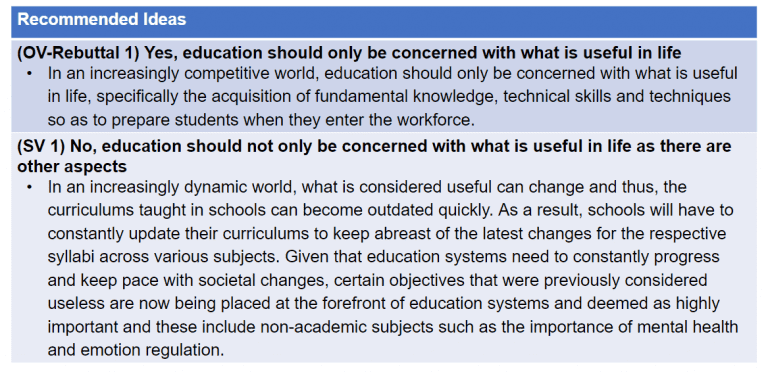Question Analysis:
Possible Ideas:
Legend:
SV = Supporting Viewpoint
OV = Opposing Viewpoint

Sample Paragraphs:
(OV-Rebuttal 1)
Critics may argue that in an increasingly competitive world, education should only be concerned with what is useful in life, specifically the acquisition of fundamental knowledge, technical skills and techniques so as to prepare students when they enter the workforce. As schools often have limited time to interact with students, the priority tends to be on the more practical aspects so that students are sufficiently equipped when they are about to start work. This is because when they enter the workforce, most employers would look at academic qualifications and whether they have the necessary skills and knowledge before hiring them. As a result, it is important that education should be concerned with the practical aspects of life. However, I argue that companies do not solely focus on hiring candidates purely on academic qualifications and technical expertise. They will also look at values and work attitudes. In a 2020 national survey done by the National Association of Colleges and Employers (NACE) in the United States of America, it was found that attributes like the ability to work with a team (86.3 per cent) and a strong work ethic (80.4 per cent) are highly prized by employers looking to hire. These attributes even superseded analytical or quantitative skills (79.4 per cent). Such a statistic demonstrates that employers do not solely look at academic qualifications and technical skills. While they are still important, there are other aspects that employers look at prior to hiring. Thus, should education systems only focus on the practical aspects of knowledge and skills acquisition, students may risk not honing the non-practical aspects such as positive work attitudes and lose their competitive edge. Therefore, education should not only be concerned with what is useful in life, specifically in terms of technical skills, as that is insufficient in an increasingly cutthroat world.
(SV 1)
However, what is useful can change overtime. In an increasingly dynamic world, what is considered useful can change and thus, the curriculums taught in schools can become outdated quickly. As a result, schools will have to constantly update their curriculums to keep abreast of the latest changes for the respective syllabi across various subjects. Given that education systems need to constantly progress and keep pace with societal changes, certain objectives that were previously considered useless are now being placed at the forefront of education systems and deemed as highly important and these include non-academic subjects such as the importance of mental health and emotion regulation. For example, the unfortunate death of a River Valley High School student in July 2021 due to an attack by a fellow student wielding an axe sparked massive online discussion about physical safety in Singapore schools and youth mental health issues. It is believed that the perpetrator had previously attempted suicide two years ago, and he was subsequently remanded in the Institute of Mental Health (IMH). This incident brought the importance of mental health into the national spotlight, with decisive measures taken by various schools to conduct programmes and initiatives regarding mental health and emotion regulation. While these moves made by formal institutes of learning are commendable, much more needs to be done to create greater awareness and to normalise the discussion about mental health. Nonetheless, it is evident that such topics were not considered of utmost importance in the past as schools focus primarily on imparting technical skills and knowledge to ensure that youth are well-equipped to enter the future workforce. While the primary focus still remains today, it is important to note that non-academic and non-examinable subjects such as the importance of mental health and emotion regulation are also crucial to a child’s holistic development amidst the dynamic nature of our world today. Therefore, what is considered ‘useless’ or ‘less important’ can change and become crucial given changing times and as such, schools should not only narrowly focus on the conventional definitions of ‘usefulness’, which is that of imparting technical skills and knowledge through academic subjects.
Links for Reference:
https://en.wikipedia.org/wiki/River_Valley_High_School_attack